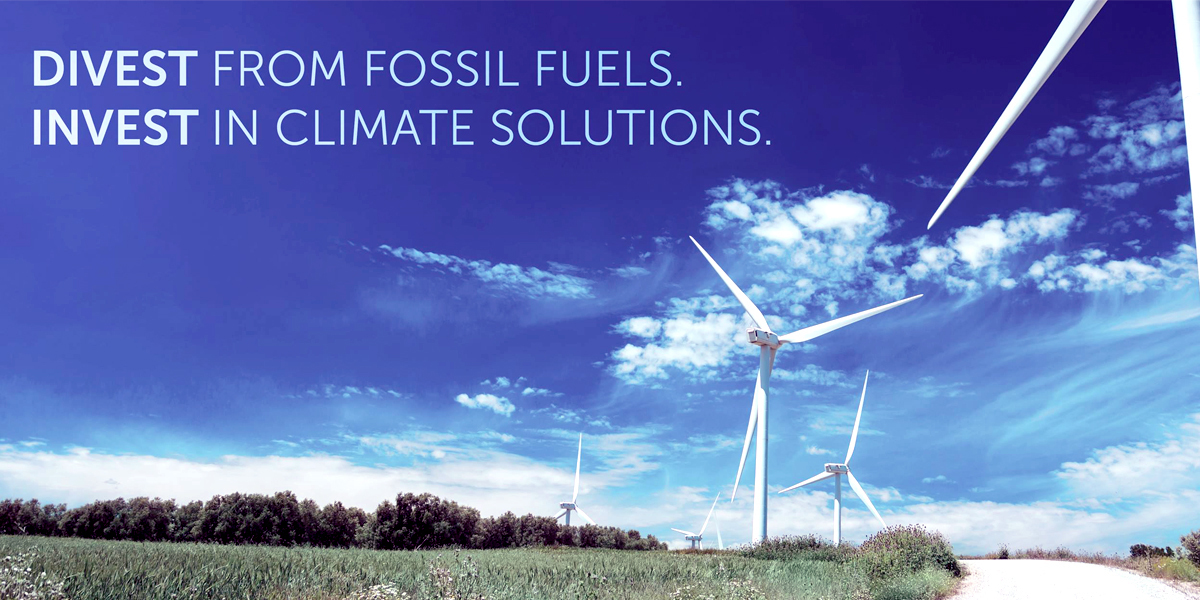
Institutions Representing $5 Trillion Pledge to Divest From Fossil Fuels

The scope of global fossil fuel divestment has doubled over the past 15 months, with institutions and individuals controlling $5.197 trillion in assets pledging to divest. The announcement comes on the first anniversary of the Paris agreement on climate change.
“One year after the adoption of the historic Paris climate agreement, it’s clear the transition to a clean energy future is inevitable, beneficial and well underway, and that investors have a key role to play,” said UN Secretary-General Ban Ki-moon.
“I commend today’s announcement that a growing number of investors are backing a shift away from the most carbon intensive energy sources and into safe, sustainable energy. Investments in clean energy are the right thing to do—and the smart way to build prosperity for all, while protecting our planet and ensuring no one is left behind.”
According to a new analysis released today by Arabella Advisors, 688 institutions and 58,399 individuals across 76 countries have committed to divest from fossil fuels. Those sectors that have historically propelled the movement—including universities, foundations and faith-based organizations—account for 54 percent of new commitments made.
Representatives from finance, philanthropy, faith, entertainment, education and others announced these numbers and showed their support for the movement at a simultaneous international press conference today in New York and London—including a former top Mobil Oil executive, Lou Allstadt, who helped implement the Exxon-Mobil merger.
“As the hottest year in history comes to a close, the success of the global fossil fuel divestment movement is undeniable,” said May Boeve, executive director of 350.org, the grassroots climate organization whose members have led the charge to divest.
“What began on a few college campuses in the U.S. has spread to every corner of the world, squarely into the financial mainstream. Divestment has permeated every sector of society: from universities and pension funds, to philanthropic and cultural institutions, to cities, faith groups, insurance companies and more. Now at $5 trillion, the movement is unstoppable. Institutions and investors must choose whether to be on the right side of history.”

Support for the movement among early adopters is now increasingly being met by support from profit-driven institutions such as large pension funds, private insurers and banks, which represent $4.5 trillion in assets, citing climate risks to their investment portfolios. As more mainstream financial institutions commit to divest, the industry faces greater scrutiny.
“The oil and gas industry is currently experiencing an unprecedented level of negative factors—from reduced profits to increased borrowing to pay dividends—while the costs of solar, wind and batteries continue to fall,” said Lou Allstadt, former executive vice president of Mobil Oil. “The prudent fiduciary is acting now to reduce the risk to their portfolios. Divestment is speeding up the clock on the final accounting that will show fossil fuels are out and clean energy is in.”
Mark Campanale, founder and executive director of Carbon Tracker Initiative, agrees. “The financial markets are fast losing faith in the investment case for fossil fuels. A technological revolution is underway in the energy and transportation sectors, as cheap solar and electric cars take away demand for coal and oil. With a climate trifecta of physical risks, stranded assets and the threat of legal liability—fiduciaries are now on notice to implement measures to protect their portfolios.”
Today’s press conference also brought forward historic new divestment commitments, including Ireland’s preeminent university, Trinity College.
“Trinity intends to play our part in delivering on the Paris agreement,” said Dr. Patrick Prendergast, the provost and president of Trinity College Dublin. “We aspire to be a leader in sustainability and climate solutions in every aspect of the college, not only in investments but in our research, and also in how the campus operates.”
The report also documents rapid growth in the faith sector fueled by Pope Francis’ “Laudato Si” encyclical establishing a moral imperative to act on climate, but commitments in the faith sector are not bound to any particular religion. A recent interfaith statement calling for divestment was signed by 303 faith leaders from 58 countries.
“Islam, like other faiths, teaches and asks its adherents to implement an ethic of restraint and conservation,” said Imam Saffet Abid Catovic, board member of Islamic Society of North America Green Masjid Task Force. “In the face of the global climate crisis, this ethic, while necessary, is not sufficient to meet this existential challenge and must be coupled with a ‘keep it in the ground’ investment policy: divesting from fossil fuel holdings and reinvesting a portion of these funds in renewable and clean energy alternatives.”
Inspired by the leadership of Mark Ruffalo and Leonardo DiCaprio, who committed to divest and invest at the movement’s prior events, the cultural sector is mobilizing.
“What the world needs now is DivestInvest Culture: A bold, collective pivot away from the old energy that no longer serves us, and toward the 100 percent renewable energy future that will let the people and the planet thrive,” said actor Adrian Grenier, announcing the new campaign today. “I am so excited to help launch DivestInvest Culture today—we are actors, musicians and artists moving our money from the past to the future.”
[facebook https://www.facebook.com/divestinvest/videos/1417999791557443/ expand=1]
These global and unparalleled commitments by both the public and private sectors are further cementing the call for a clean energy transition—and challenge the U.S. energy policy of the Trump administration, which is shaping up to favor the expansion of the financially risky and environmentally destructive fossil fuel industry.
“At the one-year anniversary of Paris, and after a historic election in the U.S., divestment is needed more than ever,” said Ellen Dorsey, executive director of the Wallace Global Fund and leader of DivestInvest Philanthropy. “When governments fall short, people step up. From Apartheid South Africa to the climate front lines, finance is a proven lever for change. Governments should keep their promises, but investors must move their money.”

 233k
233k  41k
41k  Subscribe
Subscribe 
